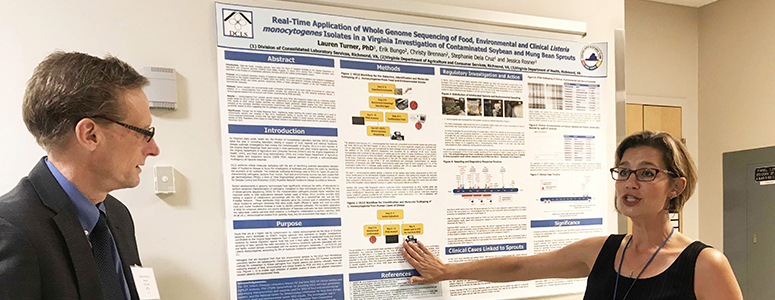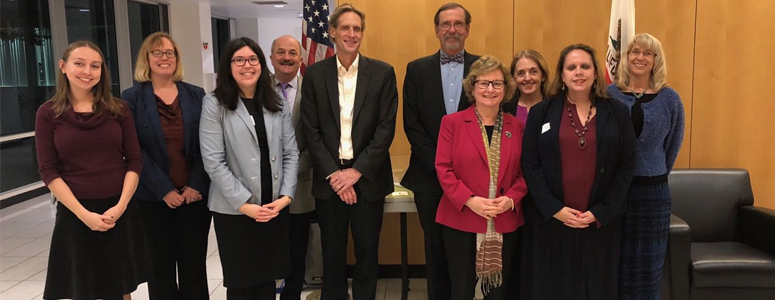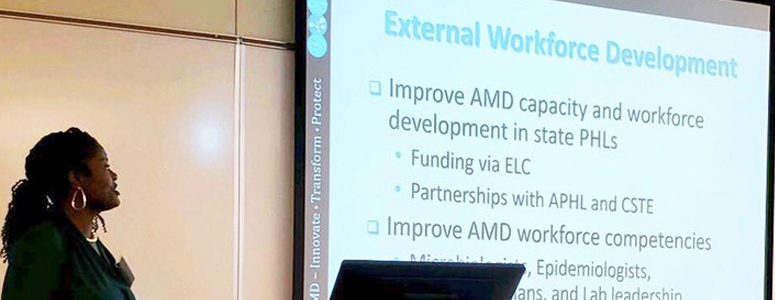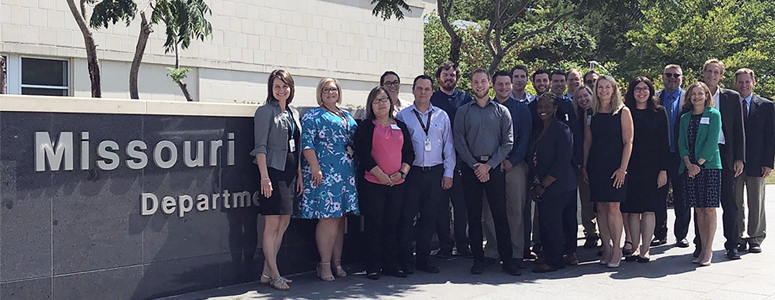Partnering with public health laboratories to expand genomic sequencing
CDC’s Office of Advanced Molecular Detection (OAMD) brings pathogen genomics to the front lines of public health by integrating the latest sequencing technology with expertise in bioinformatics and epidemiology. State, tribal, local, and territorial (STLT) public health laboratories and health departments play a vital role in understanding the transmission and evolution of SARS-CoV-2 and other pathogen outbreaks. Partnering with STLT public health laboratories is paramount to our efforts to identify, track, and stop infectious diseases.
Scientists use the genetic information of pathogens, including SARS-CoV-2, to:
- Monitor important changes in pathogens as they continue to circulate.
- Gain important insights to support public health interventions.
- Provide crucial information to aid in developing and updating diagnostics and therapeutics.
- Advance public health research in the areas of transmission dynamics, host response, and evolution of the virus.
OAMD’s State and Global Extramural team has partnered with STLT public health laboratories for several years to expand workforce development, increase bioinformatics technical support, and expand AMD capacity in the United States. By ensuring STLT health departments have the resources and infrastructure they need, we can help pathogen genomics become routine throughout the US public health system.
CDC and Association of Public Health Laboratories (APHL) Partnership
CDC’s OAMD partnered with the Association of Public Health Laboratories (APHL) to create a fellowship that trains post-masters and post-doctoral bioinformaticians for a career in public health as they serve in STLT laboratories throughout the United States. The opportunity provides fellows with a range of real-world experience while they apply their expertise to analyze data and develop tools that will aid in combatting existing or emerging public health threats.
Since 2013, 38 APHL-CDC bioinformatics fellows have been placed in a public health laboratory, with one-third of the placements in jurisdictional laboratories outside of CDC. To date, 75% of the fellows are currently working in public health. They continue to make an impact beyond their home laboratory, providing technical assistance, analysis, and training to other public health scientists around the country.
Technical Assistance
COVID-19 Genomic Epidemiology Toolkit
OAMD recently designed and launched a COVID-19 Genomic Epidemiology Toolkit to help local epidemiologists respond to the COVID-19 pandemic. This toolkit demonstrates how to apply genomic data to state and local investigations and track SARS-CoV-2 variants circulating in their jurisdictions. It also helps epidemiologists further the use of genomics while responding to COVID-19 at the state and local level.
Technical Outreach and Assistance for States Teams
OAMD recently created a Technical Outreach and Assistance for States Team (TOAST) in coordination with the COVID-19 response’s Laboratory and Testing Task Force. TOAST aims to identify and reduce barriers in SARS-CoV-2 sequencing and data analysis at the state, local, and territorial level. It provides resources to help state laboratories with COVID-19 sequencing. Team members include wet lab and bioinformatic staff with sequencing and data analysis/processing experience.
Moving OAMD Partnerships Forward
With funding from the American Rescue Plan Act of 2021, the AMD program will support state, tribal, local, and territorial public health laboratories with more staff and resources to collect specimens for COVID-19 testing, sequence them to identify and track SARS-CoV-2 variants, and share data. Ideally, OAMD will place an AMD specialist in each state and territory.
OAMD also plans to establish six Centers of Excellence in Genomic Epidemiology to operate in tandem between state health departments and academic institutions, allowing all parties to share cutting-edge research. We are also working to develop a cloud-based national bioinformatics infrastructure to provide public health partners with access to data across the nation.
Stay tuned for more updates!



